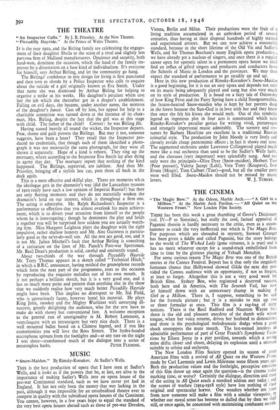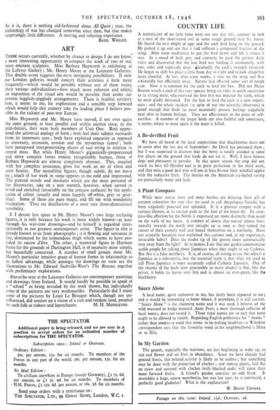THE CINEMA
" The Magic Bow." At the Odeon, Marble Arch.--'i A Girl in a Million." At the Marble. Arch Pavilion.—"All Quiet on the Western Front." NeW London Film Society.
THERE has been this week a great thumbing of Grove's Dictionary (vol. IV—P to Sonatina), but really the cool, factual appraisal of Paganini therein is hardly necessary to the critic, even as a steam- hammer to crack the very ineffectual nut which is The Magic Bow. For purposes which are shrouded in mystery, Stewart Granger has been given a fiddle and called Paganini, but the story belongs to the world of The Wicked Lady (gone virtuous, it is true) and it has no merit whatever except for a sound-track embellished from time to time by the glorious playing of Yehttdi Menuhin.
For some curious reason The Magic Bow was one of the British entries at the Cannes Festival. Report has it that only the singularly fortunate chance that Hollywood showed Gilda the next day pro- vided the Cannes audience with an opportunity, if not to forgive, at least to forget. Altogether this is not a very good week for British films. Sydney Box, who registered a deserved success, both here and in America, with The Seventh Veil, has no a' let himself down with an unnecessary thump in making A Girl in a Million. There is, I suppose, something to be said for the formula picture ; but it is a mistake to mix up two or three formulae at once. This film is a rag-bag of natty notions. There is the. Basil Radford and Naunton Wayne bit; there is the old and pleasant anecdote of the dumb wife whose tongue, when her voice returns, drives her husband to distraction ; and there is the psychological melodramatic dodge when a great shock unstoppers the mute mouth. The last-named involves an admirable performance of part of Cesar Franck's Symphonic Varia- tions by Eileen Joyce in a pier pavilion, towards which a roving mine drifts closer and closer, delaying its explosion until a moment suitable to soloist and orchestra.
The New London Film Society opened its season of great American films with a revival of All Quiet on the Western Front, made by Carl Laemmle and Lewis Milestone some fifteen years ago. Both the production values and the forthright, perceptive emotions of this film throw up once again the question—is the cinema today
marking time, or worse? Certainly the dialogue, direction and most
of the acting in All Quiet reach a standard seldom met today ; and the scenes of warfare (1914-1918 style) have lost nothing of their original and spectacular horror. One wonders whether ten years from now someone will make a film with a similar viewpoint, or whether our moral sense has become so dulled that by then we shall still, or once again, be concerned with maintaining combatant morale. As it is, there is nothing old-fashioned about All Quiet ; true, the technology of war has changed somewhat since then, but'that makes surprisingly little difference. A moving and sobering experience.
BASIL WRIGHT.































 Previous page
Previous page